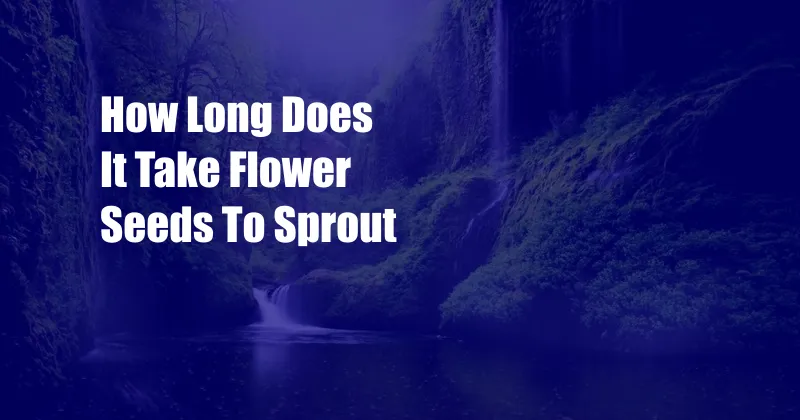
How Long Does it Take Flower Seeds to Sprout?
The anticipation of watching tiny flower seeds transform into vibrant blooms can be an exciting journey for any gardener. The time it takes for flower seeds to sprout varies depending on several factors, including the species, temperature, soil conditions, and moisture levels. Understanding these factors can help you optimize the germination process and enjoy a successful gardening experience.
Sprouting, the initial stage of plant growth, occurs when a seed absorbs water and begins to grow. The process involves the seed’s embryo emerging from its protective coat and developing into a seedling. The rate at which seeds germinate depends on the specific plant species. Some seeds, like marigolds and zinnias, can sprout within a few days, while others, such as trees and shrubs, may take weeks or even months.
Temperature plays a crucial role in seed germination. Most flower seeds prefer warm temperatures between 65°F and 85°F (18°C and 29°C). Deviations from these optimal temperatures can slow down or prevent germination altogether. For example, seeds that require warm temperatures will struggle to sprout in cold soil.
Soil conditions are another important factor affecting seed germination. Well-drained soil that is loose and aerated allows water and oxygen to reach the seeds easily. Heavy or compacted soil can hinder germination by preventing water penetration and gas exchange.
Moisture levels are also essential for seed germination. Seeds need to absorb water to initiate the sprouting process, but too much water can lead to rotting. Watering the soil evenly and keeping it moist but not waterlogged is key for optimal germination.
Understanding the specific requirements of the flower seeds you plant will help you create the ideal conditions for germination. By providing the right temperature, soil conditions, and moisture levels, you can increase the chances of successful seed germination and enjoy a thriving garden of beautiful blooms.
Tips for Successful Seed Germination
To enhance the chances of successful seed germination, follow these expert tips:
Plan the Timing: Research the ideal time to sow seeds based on their specific requirements. Some seeds prefer to be sown in warm spring temperatures, while others do well in cooler autumn months.
Prepare the Soil: Ensure the soil is well-drained, loose, and rich in organic matter. Amend the soil with compost or peat moss to improve its structure and fertility.
Provide Adequate Moisture: Water the soil evenly and keep it moist but not waterlogged. Avoid overwatering, as it can lead to seed rot.
Follow Depth Instructions: Plant seeds at the correct depth specified on the seed packet. Too shallow or too deep planting can reduce germination success.
Provide Light: Most flower seeds need light to germinate. Sow them in a sunny location or provide artificial light.
Be Patient: Germination can take time, especially for some species. Be patient and maintain the optimal conditions for the seeds to sprout.
Frequently Asked Questions (FAQs)
Q: Why are my seeds not germinating?
A: Possible reasons include incorrect temperature, soil conditions, moisture levels, or seed age. Check that you are meeting the specific requirements of the seeds and try again.
Q: Can I improve the germination rate of slow-germinating seeds?
A: Yes, you can try soaking the seeds in warm water for 24-48 hours before sowing to encourage germination.
Q: How do I care for seedlings after they sprout?
A: Once the seedlings emerge, provide adequate light, water, and nutrients. Thin out the seedlings if they are overcrowded to promote healthier growth.
Conclusion
Understanding the factors that influence seed germination and following the tips provided will help you achieve successful seed germination. Remember that patience and attention to detail are key. Whether you are a seasoned gardener or a novice, the joy of nurturing flower seeds into vibrant blooms is a rewarding experience that will bring beauty and fulfillment to your garden.
Are you interested in learning more about seed germination? Feel free to explore further resources or reach out to gardening experts for personalized advice.